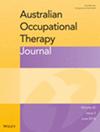Examining the clinical utility of the Occupational Therapy Observation Tool–Adjustment Support Details (OTOT-ASD): Experiences of paediatric occupational therapists
Abstract
Introduction
Standardised assessments are necessary for autistic children and are part of the process of gathering information to develop intervention plans, to monitor progress and gain funding. Due to behavioural characteristics that may be displayed by autistic children, the required structure and demands of standardised assessments can lead to inaccurate results of a child's skills and abilities, impacting outcomes. The Occupational Therapy Observation Tool–Adjustment Support Details (OTOT-ASD) is a descriptive companion tool to be utilised alongside standardised assessment, to enhance accurate assessment of a child's true skills and abilities. This study examines the clinical utility of the OTOT-ASD from the experiences and perspectives of paediatric occupational therapists.
Consumer and community involvement
Consumers and community members were not involved in the design, execution or write up of the study results.
Method
This study used a mixed methods design. Six paediatric occupational therapists were recruited and trained to use the OTOT-ASD in clinical practice for a four-week trial block. Clinicians' perspectives were collected via semistructured interviews and a brief questionnaire. Findings were analysed using descriptive statistics and thematic analysis.
Results
Data analysis revealed four major themes: clinical experiences of using the OTOT-ASD; perceived clinical benefits; recommendations and future use; and what constitutes clinical utility. The majority of the participants indicated a favourable response to the OTOT-ASD clinical utility. Some suggestions for improvement included modifying the title, broadening the population, expanding the function of the tool and providing more educational resources for training.
Conclusion
The findings from this study suggest that the OTOT-ASD is a clinically useful instrument that can support accurate occupational therapy assessment of autistic children. Further, by way of examining the clinical utility of the OTOT-ASD, this study identified key indicators of clinical utility from an occupational therapy perspective.
PLAIN LANGUAGE SUMMARY
Occupational therapists test the skills of children who have autism to determine their strengths, challenges and to help choose the best strategies to use. Adjustments to testing are often needed for autistic students, as they can make errors when they feel stressed by being tested. Behaviour during testing can also cause poor results that do not show what the student is truly capable of doing. The researchers trained six therapists to use a form called the OTOT-ASD when completing tests. The form is used rate the behaviours and factors seen while testing. The therapists were asked to rate how useful the tool was. They also commented on ways to improve it and what things they consider important when deciding which tools to use.


 求助内容:
求助内容: 应助结果提醒方式:
应助结果提醒方式:


